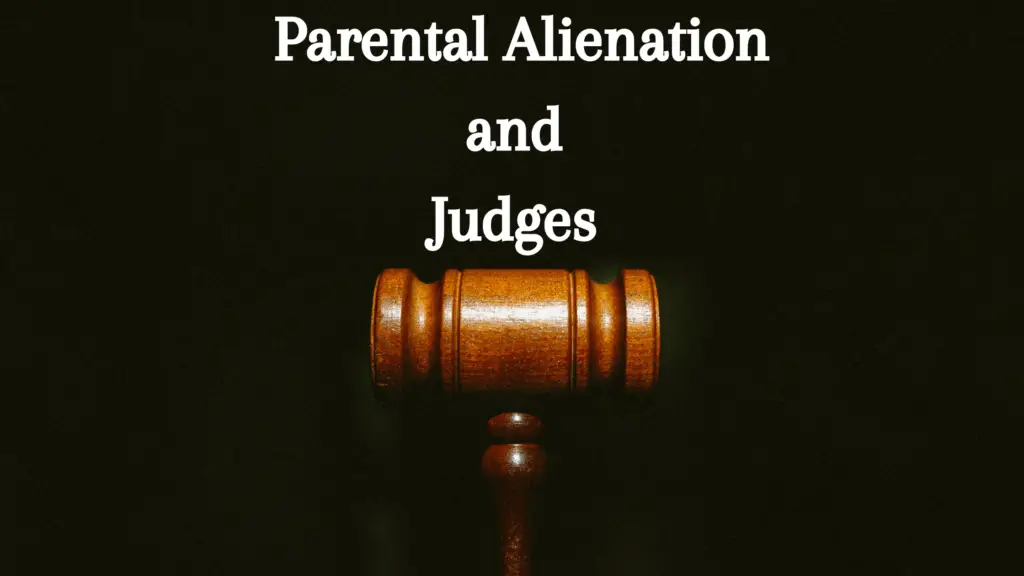In the heart-wrenching landscape of family law, one issue stands out for its emotional complexity and deep-seated impact: parental alienation. Imagine a scenario where children, already grappling with the tumultuous waters of their parents’ divorce, are unwittingly drawn into a twisted narrative that pits one parent against the other. This distressing phenomenon, known as parental alienation, has gained significant traction within legal circles and beyond. Apparently, many have gone a step further to look for judges view on parental alienation.
Understanding Parental Alienation
Before getting to understand judges view on parental alienation, it is crucial to understand parental alienation.
Parental alienation isn’t just a term; it’s a heartrending reality that has shattered countless families. It refers to a situation where one parent, often with intention, endeavors to erode the child’s affection and bond with the other parent. This can manifest in derogatory comments, discouraging contact, or even manipulating the child into believing falsehoods about the alienated parent. At its core, parental alienation undermines the child’s ability to forge a healthy and nurturing relationship with both parents.
Parental alienation is not a monolithic entity; it exists on a spectrum, with various degrees of intensity and manipulation. In mild cases, a parent might subtly influence the child against the other parent, while in severe instances, the child may develop a strong aversion to one parent, sometimes even refusing contact altogether. Understanding these gradations is crucial in crafting appropriate legal responses.
The emotional fallout of parental alienation is staggering and far-reaching. Children caught in this web of manipulation often grapple with feelings of confusion, guilt, and emotional turmoil. They’re forced into loyalty binds, torn between the love they feel for each parent and the pressure to choose sides. Alienated parents, on the other hand, suffer not only from the loss of a relationship with their child but also from a sense of helplessness and injustice.
Judges View on Parental Alienation
The trajectory of parental alienation within legal frameworks has evolved significantly over time. Initially met with skepticism and sometimes dismissed as an unfortunate consequence of divorce, parental alienation is now recognized as a genuine concern with profound implications for children’s well-being. The integration of psychological insights into legal considerations has driven this transformation, underlining the intersection between emotional harm and legal remedies.
Judges view on parental alienation is that it is a serious form of child abuse. They understand that it can have a devastating impact on children, who may come to believe that the alienated parent is dangerous or evil. This can lead to children refusing to see the alienated parent, which can disrupt their relationship and cause them emotional harm.
Judges are also aware that parental alienation can be difficult to prove. The alienating parent may be very good at manipulating the child and making them believe that the other parent is bad. In some cases, the child may even be coached to lie about the alienated parent.
Legal Landscape in the United States
The legal recognition of parental alienation in the United States varies widely across states. Some states explicitly include parental alienation in their statutes, acknowledging its detrimental impact on children and families. However, others address it indirectly, classifying it as interference with parenting time or custodial rights.
The legal treatment of parental alienation is often shaped by precedent-setting court cases. These cases serve as guideposts for judges, providing insights into how to weigh evidence, evaluate claims, and deliver fair judgments that prioritize the best interests of the child.
Child custody and visitation orders act as a crucial juncture in addressing parental alienation. Courts must delicately balance the child’s emotional well-being with the rights of both parents. Striking this balance requires a nuanced understanding of the family dynamics and the potential consequences of different custody arrangements.
When allegations of parental alienation surface, judges are tasked with a formidable challenge: assessing the credibility of the claims and making decisions that safeguard the child’s mental and emotional welfare. Evidentiary standards are stringent due to the gravity of the accusations involved.
Proving parental alienation within the legal system is no small feat. Judges often rely on a mosaic of evidence, including expert testimonies from psychologists, therapists, and social workers. Piecing together a comprehensive picture of the situation is essential to ensure the accuracy of judgments.
Is Parental Alienation Recognized?
Parental alienation is not recognized as a diagnosable mental disorder by the American Psychiatric Association (APA). However, it is a recognized phenomenon in the legal community and is often used as a defense in child custody cases. Get to understand how family court judges theorize about parental alienation.
On a global scale, the recognition of parental alienation varies widely. While some jurisdictions wholeheartedly embrace it as a distinct issue requiring targeted intervention, others remain cautious due to concerns about misuse, overuse, or the potential for ambiguity in defining parental alienation.
Harmonizing the legal definition of parental alienation is a complex endeavor. Differing jurisdictions offer varying interpretations, sometimes referring to it as “malicious mother syndrome,” “malicious parent syndrome,” or “parental alienation syndrome,” among others. These variations can lead to inconsistencies in how parental alienation is addressed legally.
As with any evolving legal concept, parental alienation is not without its critics. Some legal scholars and professionals argue that its recognition might inadvertently serve as a strategic tool in custody battles, leading to accusations that may not be substantiated. Additionally, the debate over whether parental alienation constitutes a distinct syndrome or a subset of broader family dynamics continues to spark discussion.
Read About: Can You Call CPS For Parental Alienation
The Parental Alienation Argument
At the heart of the parental alienation issue lies a fundamental argument: that one parent is actively manipulating the child against the other parent. This argument is centered on the premise that the alienating parent’s behavior is causing harm to the child’s relationship with the targeted parent.
Factors and Behaviors That Constitute Parental Alienation
Identifying parental alienation involves examining a constellation of behaviors. These may include making derogatory comments about the other parent, withholding access to the child, or fabricating stories that damage the child’s perception of the targeted parent. Judges scrutinize these behaviors in conjunction with expert testimonies to ascertain the validity of claims.
How Judges Evaluate the Validity of Parental Alienation Claims
Judges embark on a meticulous process when evaluating parental alienation claims. They carefully assess the credibility of both parents, taking into account their past behaviors and motivations. The child’s statements, often obtained through interviews conducted by experts, play a crucial role in determining whether genuine parental alienation is at play.
Balancing the Presumption of Innocence and Children’s Well-Being
While the seriousness of parental alienation allegations demands swift action, judges must also uphold the presumption of innocence. This delicate balancing act aims to protect the child’s emotional health while ensuring that allegations are substantiated before any drastic measures are taken.
Judicial Views and Approaches
Balancing Parental Rights and Children’s Best Interests
Judges find themselves at the crossroads of upholding parental rights and safeguarding children’s best interests. This intricate balancing act requires a deep understanding of family dynamics, child psychology, and the potential consequences of their decisions.
The Role of Judges in Identifying and Addressing Parental Alienation
Judges serve as the front line in identifying signs of parental alienation. Their discernment is essential in distinguishing between legitimate concerns and strategic allegations, ensuring that children’s well-being remains paramount.
Factors Considered by Judges in Cases of Alleged Parental Alienation
Navigating parental alienation cases requires a holistic assessment. Judges consider the child’s age, the motivation behind the alienating behaviors, the history of the relationship between the child and each parent, and the overall impact on the child’s emotional and mental state.
Judicial Discretion in Determining Appropriate Remedies
There is no one-size-fits-all solution to parental alienation. Judges exercise their discretion to determine the most appropriate remedies for each case. These solutions might include family counseling, therapy, supervised visitation, or even adjustments to custody arrangements.

Legal and Psychological Interventions
Court-Ordered Interventions and Therapeutic Approaches
Judges wield the power to prescribe interventions that facilitate healing and reconciliation. Court-ordered therapy, counseling, and parenting classes provide families with the tools they need to mend fractured relationships.
Collaborative Models to Mitigate Parental Alienation
Collaborative law processes offer an alternative to courtroom battles. These models encourage parents to set aside animosity and focus on jointly resolving the underlying issues driving parental alienation.
Challenges in Enforcing Court Orders and Interventions
Implementing court orders aimed at addressing parental alienation can be a complex endeavor. Compliance relies heavily on the cooperation of both parents. When one party resists, additional legal measures may be necessary.
The Intersection of Parental Alienation and Child Welfare
Link between Parental Alienation and Child Abuse/Neglect
In severe cases, parental alienation can serve as a precursor to child abuse or neglect. Judges must remain vigilant in their pursuit of children’s well-being, as the thin line between alienation and abuse is a critical consideration.
Consideration of Parental Alienation in Custody Evaluations
Custody evaluations, conducted by qualified professionals, play a pivotal role in parental alienation cases. These evaluations provide valuable insights into family dynamics, psychological well-being, and the child’s relationship with each parent.
Ensuring Children’s Voices Are Heard in Court
The importance of involving children in decisions that impact their lives is increasingly recognized. Judges seek ways to incorporate children’s perspectives in a manner that respects their emotions and preferences.
Read About: Tips for Custody Evaluators and Family Court Judges on Parental Alienation
Criticisms and Controversies
Concerns About False Accusations and Manipulation
Critics of parental alienation claims highlight the potential for abuse. They argue that allegations of alienation can be strategically employed as a weapon in custody battles, potentially causing unjust harm to the accused parent.
Debate Over Legal Definitions and Standards of Proof
The lack of standardized definitions and varying thresholds for proof can result in inconsistent outcomes. This issue underscores the need for clear guidelines that protect both children and parents from misuse of the concept.
The Role of Mediation and Alternative Dispute Resolution
While court proceedings are vital in addressing parental alienation, some advocate for greater emphasis on mediation and alternative dispute resolution. These approaches can foster open communication and cooperation among parents, ultimately benefiting the child.
Conclusion
Judges view on parental alienation is that it is a type of child abuse. Judges take the lead in untangling the complexities brought forth by the issues of parental alienation. With an unwavering dedication to the welfare of children and a deep respect for parental rights, judges assume an irreplaceable role in guiding the path toward healing and reconciliation. The intricate equilibrium between safeguarding parental rights and prioritizing the child’s best interests presents an enduring challenge. However, this challenge is not insurmountable; it can be met through meticulous thought, compassionate discernment, and a spirit of collaboration.







